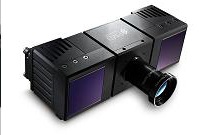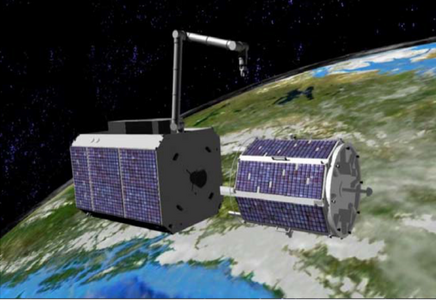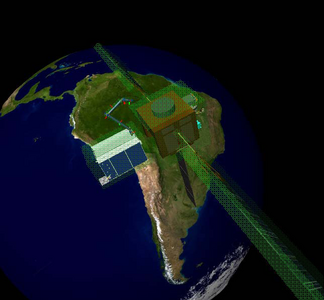FORROST
Innovative Technologies for On-Orbit Satellite Servicing
Project Description
Forschungsverbund Robotische On-Orbit Servicing Technologien (FORROST), is a research network with industrial and academic partners led by the DLR (Deutsches Zentrum für Luft- und Raumfahrt) to develop technologies to perform autonomous Rendezvous and Docking (RVD) maneuvers with cooperative and non-cooperative satellites for on-orbit servicing.
Within the scope of this project, the department of Robotics and Telematics, Informatics chair 7, at the University of Würzburg is actively working to develop innovative technological solutions to achieve high degree of autonomy in RVD operations. Specifically, efforts are focused on
- Spacecraft motion estimation using Photonic Mixer Device (PMD) sensor based 3D camera
- Robotic arm path planning and its trajectory optimization to grasp another spacecraft during RVD
- Autonomous collision detection and avoidance
Satellite Pose and Motion Estimation
PMD cameras are state-of-the-art 3D imaging sensors capable of providing not only intensity images of the observed scene but also depth to the corresponding points along with the information about quality of observation. They are based on the Time-of-Flight (TOF) principle. By actively illuminating the scene and analyzing the phase difference between the reflected and reference signals using autocorrelation technique the depth information is inferred. The images from the 3D camera are then analyzed to estimate and predict the pose and motion of an object, specifically that of a spacecraft. The ongoing research activities include image processing, object recognition, motion analysis and data fusion among others.
![PMD[Vision] CamCube 2.0](/fileadmin/_processed_/0/f/csm_image2_14_37d6db02bc.png)

Robotic Arm Motion Planning and Trajectory Optimization
For rendezvous with non-cooperative spacecrafts, the target satellite may or may not have a valid docking port and the satellite is not operational and out of control. In those conditions, a robotic arm mounted on the service satellite would be used to grasp the target satellite. With this aim, an optimal trajectory for the deployment of arm has to be calculated, which minimizes energy constraints while taking care of the inertial forces involved. While DLR works in generating possible trajectories using direct optimizations methods, the University of Würzburg would be contributing to with the investigation and evaluation of optimization criteria using indirect methods.

Collision Detection and Avoidance
A critical aspect in RVD maneuvers is when both satellites get to very short distances from one another. The final approach to docking or grasping must be executed with extreme care in order to avoid collisions. The University of Würzburg is also actively working on early detection of possible collision situations as well as measures to avoid it. For this, transfer of knowledge gained in similar applications with terrestrial mobile robots is being considered.

Project Partners
| Deutsches Zentrum für Luft- und Raumfahrt |  |
| Julius Maximilians Universität Würzburg LS für Informatik VII |  |
| Hochschule Hof |  |
| Technische Universität München LS für Raumfahrttechnik |   |
| Universität Erlangen-Nürnberg LZS |   |
| Kayser-Threde GmbH | |
| SpaceTech GmbH |  |
| Zentrum für Telematik e.V. |  |
Sponsor
The FORROST research activities held at University of Würzburg are funded by Bayerische Forschungsstiftung (BFS), the Bavarian Research Foundation.

Joining the Team
Opportunities for students to take part in FORROST activities are wide open. Students are invited to explore possibilities for thesis work in the field of image processing, 3D computer vision, PMD camera calibration, Spacecraft orbital dynamics, trajectory planning and optimization of robotic arm among others.
Contacts
For detailed information about the FORROST project and opportunities to work for the project, interested people are requested to approach the team members:
Prof. Dr. Klaus Schilling
Head of the project
schi@informatik.uni-wuerzburg.de
+49-931-31-86647


